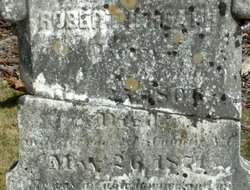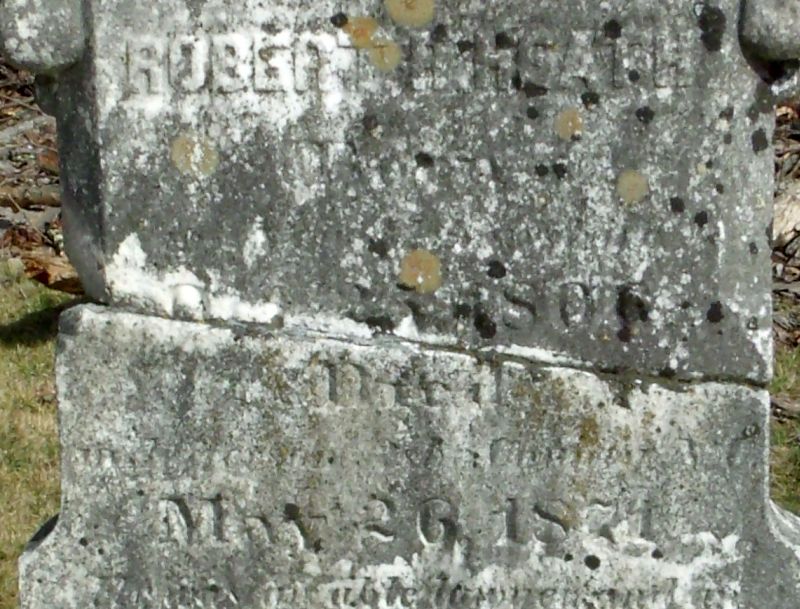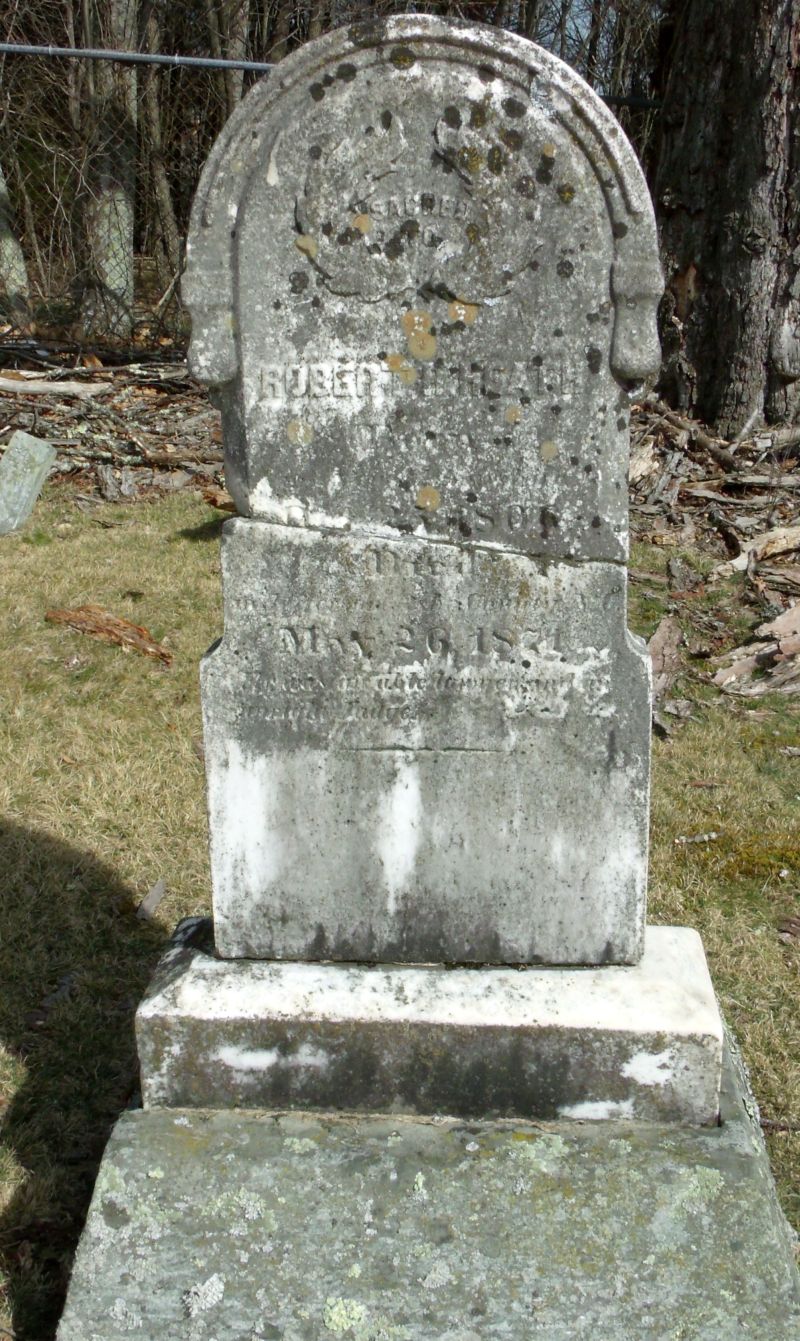Robert married 27 Feb 1829 in Washington County, NC, Eliza B. Haughton, daughter of Thomas B. Haughton. There were seven known children of this union:
Laura E.
Anna B.
Ellen B. married Dr. Edmund Shorb
Alice
Louisa
Genevieve
Robert M. (1850-1918)
Eliza (Haughton) Heath died about 1868. Robert married second 19 Aug 1869 in Ashe County, NC, America C. (Rousseau) Bower, widow of George Bower. After Robert's decease, she married Dolphin Alston Davis, of Fayetteville.
Gaston County NC District Court Judge 1858-1860
Superior Court Bench of North Carolina 1862
JUDGE R. R. HEATH eulogy - Author unknown; file at Dartmouth College:
If we knew the woe and heartache
Waiting for us down the road,
Would we waste the day in wishing
For a time that ne'er can be?
-Anon.
There arrived in Edenton from New Hampshire, on a schooner from Boston, a young man, a stranger, without pecuniary means, slender of person, modest and retiring in demeanor, seeking employment. He was an educated man, and appeared to have graduated at Dartmouth College. The Trustees of Edenton Academy, hospitable to merit, employed him as an assistant in that institution, to Jos. H. Saunders, who was principal in the flourishing institution. That man was Robt. R. Heath, afterward a judge of the Superior Court of North Carolina. He remained in that employment for three or four years, exhibiting a social and agreeable disposition and becoming a favorite in the community. During this period he was engaged, in an irregular and desultory manner, in studying law with George W. Barney, who had, some years before, come to Edenton from New Hampshire, and had acquired wealth by his law practice and by marriage, and who, later, dishonored the profession of which he was a conspicuous member.
One fine morning the boys who were his pupils were startled by the news that their teacher had gone to Raleigh to be made a lawyer. They whistled aloud and put their fingers on their nose, for none of them knew that their schoolmaster was studying law. However, at that period "honors were easy," and the Supreme Court ground all the grist that was brought to the mill. He came back, after some days, a lawyer, and the boys, always on the lookout for knowledge, heard that all the law that he carried to the mill was stuffed into him by Barney, who was a good lawyer, as they rode together to Raleigh.
After obtaining his license, he left the school and took a law office, but was not much in it. He, however, attended to his business irregularly, and Thos. B. Haughton, an old lawyer, whose daughter Mr. Heath subsequently married, sometimes said, to the surprise of others, that Heath was one of the best lawyers in the town, but no one believed it. After his marriage, and while Mr. Haughton lived, he did but little, a sort of flotsam of the profession. But when Mr. Haughton was drowned, leaving a very large estate, heavily involved and ultimately bankrupt, Mr. Heath waked up to the reality of his situation, poor, the son-in-law of a bankrupt father, dependent upon himself, with nothing but his law books, a family looking to him for bread; and he became a man.
He removed to Edenton from the country. He was diligent in business. He made friends. He won clients. He gained causes. He was a plain man. Plain in his attire. Plain in his manners. Plain and free and simple in his intercourse. He followed the courts from Currituck to Hyde, and was everywhere a favorite. In politics he was an unterrified Democrat, at a time when it was thought not to be decent to be other than a Whig. Democrats recognized him as an able leader in whom there was "no variableness nor shadow of turning." He was everywhere their trusted leader, counselor and guide. He was a thorough, well-posted politician and Democrat, not a speaker of the first class, but eminently wise in counsel.
Mr. Heath was now a leader in the profession, with a leading practice in all the courts, the peer of the ablest in a bar that presented a galaxy of talent, and numbered among its members Moore, and Kinney, and Outlaw, and Cherry, and Bragg, and Jim Allen, and Tom Jones, and Jas. Jones, and Haughton, and Jesse Wilson, and Bailey, and Sheppard, and Smith, and Elliott, and Paine, and Brooks, and Martin. Among this array of talent, Mr. Heath held high rank, as a ready, astute and profound lawyer. His memory of authority and precedent was a marvel. At a moment's notice he would cite cases by name and page and in point.
In Edenton, where he lived, he was the acknowledged rival of Judge Moore, and their conventional courtesy there was too much rivalry for cordial friendship. Moore was laborious, painstaking, cautious, earnest. Heath was ready, quick, alert, surprising. Moore was earnest, and earnestness sometimes arose to eloquence. Heath was calm, easy, placable, even-tempered. Moore was impassioned and vehement. Generally Moore was the more successful lawyer.
In the courthouse in Edenton there is a marble tablet with notable judges, among whom Robert Heath.
History of Western North Carolina - Chapter 8-A
Ashe county North Carolina -- Jefferson:
Old Buildings: The building now known as Jefferson Inn was built in two parts by the late George Bower. The part used by the Bank of Ashe was built first, but the date cannot be determined definitely, and the eastern part some years later. The frame building next to the east was George Bower's store, in which the postoffice was kept, and holes in the partitions are still visible which had been used for posting letters. James Gentry was killed one snowy Christmas night about the year 1876, in front of this building while Mont. Hardin was keeping hotel. Douglas Dixon was tried for the murder, but was acquitted. It was in this building also that Judge Robert R. Heath, sick and delirious, inflicted a wound upon himself from which he afterwards died. The hand-forged hinges and window fastenings indicate that the building is old.
Robert married 27 Feb 1829 in Washington County, NC, Eliza B. Haughton, daughter of Thomas B. Haughton. There were seven known children of this union:
Laura E.
Anna B.
Ellen B. married Dr. Edmund Shorb
Alice
Louisa
Genevieve
Robert M. (1850-1918)
Eliza (Haughton) Heath died about 1868. Robert married second 19 Aug 1869 in Ashe County, NC, America C. (Rousseau) Bower, widow of George Bower. After Robert's decease, she married Dolphin Alston Davis, of Fayetteville.
Gaston County NC District Court Judge 1858-1860
Superior Court Bench of North Carolina 1862
JUDGE R. R. HEATH eulogy - Author unknown; file at Dartmouth College:
If we knew the woe and heartache
Waiting for us down the road,
Would we waste the day in wishing
For a time that ne'er can be?
-Anon.
There arrived in Edenton from New Hampshire, on a schooner from Boston, a young man, a stranger, without pecuniary means, slender of person, modest and retiring in demeanor, seeking employment. He was an educated man, and appeared to have graduated at Dartmouth College. The Trustees of Edenton Academy, hospitable to merit, employed him as an assistant in that institution, to Jos. H. Saunders, who was principal in the flourishing institution. That man was Robt. R. Heath, afterward a judge of the Superior Court of North Carolina. He remained in that employment for three or four years, exhibiting a social and agreeable disposition and becoming a favorite in the community. During this period he was engaged, in an irregular and desultory manner, in studying law with George W. Barney, who had, some years before, come to Edenton from New Hampshire, and had acquired wealth by his law practice and by marriage, and who, later, dishonored the profession of which he was a conspicuous member.
One fine morning the boys who were his pupils were startled by the news that their teacher had gone to Raleigh to be made a lawyer. They whistled aloud and put their fingers on their nose, for none of them knew that their schoolmaster was studying law. However, at that period "honors were easy," and the Supreme Court ground all the grist that was brought to the mill. He came back, after some days, a lawyer, and the boys, always on the lookout for knowledge, heard that all the law that he carried to the mill was stuffed into him by Barney, who was a good lawyer, as they rode together to Raleigh.
After obtaining his license, he left the school and took a law office, but was not much in it. He, however, attended to his business irregularly, and Thos. B. Haughton, an old lawyer, whose daughter Mr. Heath subsequently married, sometimes said, to the surprise of others, that Heath was one of the best lawyers in the town, but no one believed it. After his marriage, and while Mr. Haughton lived, he did but little, a sort of flotsam of the profession. But when Mr. Haughton was drowned, leaving a very large estate, heavily involved and ultimately bankrupt, Mr. Heath waked up to the reality of his situation, poor, the son-in-law of a bankrupt father, dependent upon himself, with nothing but his law books, a family looking to him for bread; and he became a man.
He removed to Edenton from the country. He was diligent in business. He made friends. He won clients. He gained causes. He was a plain man. Plain in his attire. Plain in his manners. Plain and free and simple in his intercourse. He followed the courts from Currituck to Hyde, and was everywhere a favorite. In politics he was an unterrified Democrat, at a time when it was thought not to be decent to be other than a Whig. Democrats recognized him as an able leader in whom there was "no variableness nor shadow of turning." He was everywhere their trusted leader, counselor and guide. He was a thorough, well-posted politician and Democrat, not a speaker of the first class, but eminently wise in counsel.
Mr. Heath was now a leader in the profession, with a leading practice in all the courts, the peer of the ablest in a bar that presented a galaxy of talent, and numbered among its members Moore, and Kinney, and Outlaw, and Cherry, and Bragg, and Jim Allen, and Tom Jones, and Jas. Jones, and Haughton, and Jesse Wilson, and Bailey, and Sheppard, and Smith, and Elliott, and Paine, and Brooks, and Martin. Among this array of talent, Mr. Heath held high rank, as a ready, astute and profound lawyer. His memory of authority and precedent was a marvel. At a moment's notice he would cite cases by name and page and in point.
In Edenton, where he lived, he was the acknowledged rival of Judge Moore, and their conventional courtesy there was too much rivalry for cordial friendship. Moore was laborious, painstaking, cautious, earnest. Heath was ready, quick, alert, surprising. Moore was earnest, and earnestness sometimes arose to eloquence. Heath was calm, easy, placable, even-tempered. Moore was impassioned and vehement. Generally Moore was the more successful lawyer.
In the courthouse in Edenton there is a marble tablet with notable judges, among whom Robert Heath.
History of Western North Carolina - Chapter 8-A
Ashe county North Carolina -- Jefferson:
Old Buildings: The building now known as Jefferson Inn was built in two parts by the late George Bower. The part used by the Bank of Ashe was built first, but the date cannot be determined definitely, and the eastern part some years later. The frame building next to the east was George Bower's store, in which the postoffice was kept, and holes in the partitions are still visible which had been used for posting letters. James Gentry was killed one snowy Christmas night about the year 1876, in front of this building while Mont. Hardin was keeping hotel. Douglas Dixon was tried for the murder, but was acquitted. It was in this building also that Judge Robert R. Heath, sick and delirious, inflicted a wound upon himself from which he afterwards died. The hand-forged hinges and window fastenings indicate that the building is old.
Family Members
Advertisement
Records on Ancestry
Advertisement





